带双宾语的动词及其用法
可接双宾语的动词

常用的能接双宾语的及物动词有:give, teach, buy, lend, find, hand, leave, sell, show, read, pay, make, offer, build, pass, bring, cook, refuse等。
I’ll fetch you a chair.我给你拿一只椅子。
(a chair是直接宾语,you是间接宾语)间接宾语可以用一个由to( 表示动作方向)或for (表示动作目标)引起的短语来表示。
这时,间接宾语置于直接宾语之后。
我们可以把上面例句改写为:I'll fetch a chair for you.一般用法如下:for example:give sth to sb = give sb sth.一、双宾语英语中,有些及物动词可接两个宾语(双宾语),即指人的间接宾语和指物的直接宾语。
常用句型为:主语+及物动词+间接宾语+直接宾语。
如:She gave me a cup of tea.她给了我一杯茶.有时,间接宾语也可改为由介词to或for引起的短语,放在直接宾语的后面。
如:She passed him the salt. =She passed the salt to him.她把盐递给了他。
Her uncle bought her an English-Chinese dictionary yesterday. = Her uncle bought an English-Chinese dictionary for her yesterday.昨天,她叔叔给她买了一本英汉词典。
双宾语的特殊情况下面几种情况,通常要用介词to或for引起的短语:1. 当直接宾语是人称代词(it/them),间接宾语是名词时:或两个宾语都是人称代词时。
如:The watch is Li Lei's. Please give it to him.这块手表是李雷的。
(完整版)带双宾语的动词
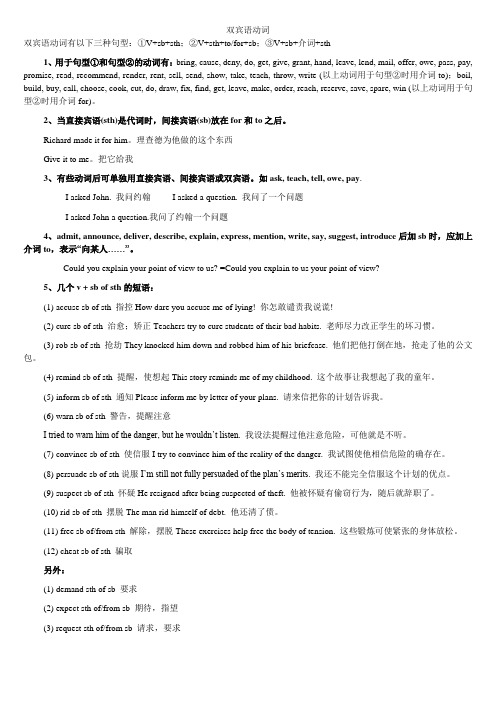
双宾语动词双宾语动词有以下三种句型:①V+sb+sth;②V+sth+to/for+sb;③V+sb+介词+sth1、用于句型①和句型②的动词有:bring, cause, deny, do, get, give, grant, hand, leave, lend, mail, offer, owe, pass, pay, promise, read, recommend, render, rent, sell, send, show, take, teach, throw, write (以上动词用于句型②时用介词to);boil, build, buy, call, choose, cook, cut, do, draw, fix, find, get, leave, make, order, reach, reserve, save, spare, win (以上动词用于句型②时用介词for)。
2、当直接宾语(sth)是代词时,间接宾语(sb)放在for和to之后。
Richard made it for him。
理查德为他做的这个东西Give it to me。
把它给我3、有些动词后可单独用直接宾语、间接宾语或双宾语。
如ask, teach, tell, owe, pay.I asked John. 我问约翰I asked a question. 我问了一个问题I asked John a question.我问了约翰一个问题4、admit, announce, deliver, describe, explain, express, mention, write, say, suggest, introduce后加sb时,应加上介词to,表示“向某人……”。
Could you explain your point of view to us? =Could you explain to us your point of view?5、几个v + sb of sth的短语:(1) accuse sb of sth 指控How dare you accuse me of lying! 你怎敢谴责我说谎!(2) cure sb of sth 治愈;矫正Teachers try to cure students of their bad habits. 老师尽力改正学生的坏习惯。
英语中可接双宾语的38个动词

英语中可接双宾语的38个动词(1)双宾语易位时需借助介词to的常用动词award sb.sth.=award sth.to sb.颁奖给某人bring sb.sth.=bring sth.to sb.把某物带给某人hand sb.sth.=hand sth.to sb.把某物递给某人lend sb.sth.=lend sth.to sb.把某物借给某人mail sb.sth.=mail sth.to sb.把某物寄给某人offer sb.sth.=offer sth.to sb.将某物给某人owe sb.sth.=owe sth.to sb.欠某人某物pass sb.sth.=pass sth.to sb.把某物递给某人pay sb.sth.=pay sth.to sb.付给某人某物(钱) post sb.sth.=post sth.to sb.把某物寄给某人read sb.sth.=read sth.to sb.把某物读给某人听return sb.sth.=return sth.to sb.把某物还给某人send sb.sth.=send sth.to sb.把某物送给某人sell sb.sth.=sell sth.to sb.把某物卖给某人serve sb.sth.=serve sth.to sb.拿某物招待某人show sb.sth.=show sth.to sb.拿某物给某人看take sb.sth.=take sth.to sb.把某物拿给某人teach sb.sth.=teach sth.to sb.教某人某物tell sb.sth.=tell sth.to sb.告诉某人某情况throw sb.sth.=throw sth.to sb.把某物扔给某人write sb.sth.=write sth.to sb.给某人写信(2)双宾语易位时需借助介词for的常用动词book sb.sth.=book sth.for sb.为某人预定某物buy sb.sth.=buy sth.for sb.为某人买某物choose sb.sth.=choose sth.for sb.为某人选某物cook sb.sth.=cook sth.for sb.为某人煮某物draw sb.sth.=draw sth.for sb.为某人画某物fetch sb.sth.=fetch sth.for sb.为某人去取某物find sb.sth.=find sth.for sb.为某人找到某物fix sb.sth.=fix sth.for sb.为某人准备某物get sb.sth.=get sth.for sb.为某人拿来某物make sb.sth.=make sth.for sb.为某人做某物order sb.sth.=order sth.for sb.为某人订购某物pick sb.sth.=pick sth.for sb.为某人采摘某物prepare sb.sth.=prepare sth.for sb.为某人准备某物save sb.sth.=save sth.for sb.为某人留某物sing sb.sth.=sing sth.for sb.为某人唱某物(歌) spare sb.sth.=spare sth.for sb.为某人让出某物steal sb.sth.=steal sth.for sb.为某人偷某物注意:(1)有的动词后接的双宾语易位时,既可用介词to引出间接宾语,也可用介词for引出间接宾语,含义相同,如bring,play等:Bring me today’s paper.=Bring today’s paper to[f or]me.把今天的报纸拿给我。
可接双宾语的动词

常用的能接双宾语的及物动词有:give, teach, buy, lend, find, hand, leave, sell, show, read, pay, make, offer, build, pass, bring, cook, refuse等。
I’ll fetch you a chair.我给你拿一只椅子。
(a chair是直接宾语,you是间接宾语)间接宾语可以用一个由to( 表示动作方向)或for (表示动作目标)引起的短语来表示。
这时,间接宾语置于直接宾语之后。
我们可以把上面例句改写为:I'll fetch a chair for you.一般用法如下:for example:give sth to sb = give sb sth.一、双宾语英语中,有些及物动词可接两个宾语(双宾语),即指人的间接宾语和指物的直接宾语。
常用句型为:主语+及物动词+间接宾语+直接宾语。
如:She gave me a cup of tea.她给了我一杯茶.有时,间接宾语也可改为由介词to或for引起的短语,放在直接宾语的后面。
如:She passed him the salt. =She passed the salt to him.她把盐递给了他。
Her uncle bought her an English-Chinese dictionary yesterday. = Her uncle bought an English-Chinese dictionary for her yesterday.昨天,她叔叔给她买了一本英汉词典。
双宾语的特殊情况下面几种情况,通常要用介词to或for引起的短语:1. 当直接宾语是人称代词(it/them),间接宾语是名词时:或两个宾语都是人称代词时。
如:The watch is Li Lei's. Please give it to him.这块手表是李雷的。
英语中接双宾语的单词汇总

英语中接双宾语的单词汇总一、动词+双宾语在英语中,有些动词可以接两个宾语,这两个宾语通常被称为直接宾语和间接宾语。
直接宾语是动词所直接涉及的对象,而间接宾语则是动词所造成的结果或受益者。
二、带有双宾语的常见动词以下是一些常见的带有双宾语的动词:1.give(给予)2.teach(教)3.buy(买)4.lend(借出)5.pass(传递)6.write(写)7.show(展示)8.ask(请求)9.answer(回答)10.tell(讲述)三、其他含有双宾语的表达除了动词,还有一些其他表达方式也可以含有双宾语,例如:1.I bought her a present.(我给她买了一件礼物。
)2.He lent me his car.(他借给我他的车。
)3.She passed me the salt.(她递给我盐。
)4.They wrote us a letter.(他们给我们写了一封信。
)5.He showed me his new car.(他给我看了他的新车。
)6.They asked us a question.(他们问了我们一个问题。
)7.She answered the phone.(她接了电话。
)8.He told us a story.(他给我们讲了一个故事。
)四、双宾语动词的用法辨析在英语中,有些动词可以接双宾语,但是它们的用法和意义有所不同。
例如,give既可以接双宾语也可以接双宾语补足语,但是它们的用法和意义不同。
五、双宾语动词的特殊用法有些双宾语动词在用法上具有特殊性。
例如,send可以接双宾语也可以接双宾语补足语,但是它们的用法和意义不同。
此外,有些动词虽然可以接双宾语,但是它们所接的宾语类型不同。
例如,ask既可以接人也可以接事物作为宾语。
六、双宾语动词的语法结构双宾语动词的语法结构通常由一个动词和一个或两个宾语构成。
直接宾语是动词所直接涉及的对象,而间接宾语则是动词所造成的结果或受益者。
常用的18个双宾语结构
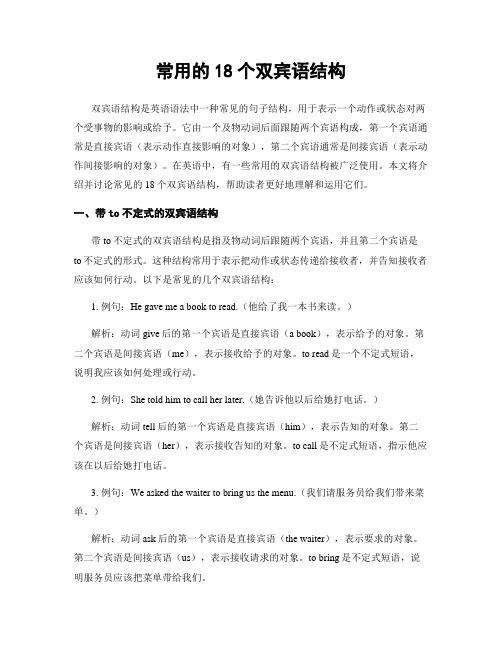
常用的18个双宾语结构双宾语结构是英语语法中一种常见的句子结构,用于表示一个动作或状态对两个受事物的影响或给予。
它由一个及物动词后面跟随两个宾语构成,第一个宾语通常是直接宾语(表示动作直接影响的对象),第二个宾语通常是间接宾语(表示动作间接影响的对象)。
在英语中,有一些常用的双宾语结构被广泛使用。
本文将介绍并讨论常见的18个双宾语结构,帮助读者更好地理解和运用它们。
一、带to不定式的双宾语结构带to不定式的双宾语结构是指及物动词后跟随两个宾语,并且第二个宾语是to不定式的形式。
这种结构常用于表示把动作或状态传递给接收者,并告知接收者应该如何行动。
以下是常见的几个双宾语结构:1. 例句:He gave me a book to read.(他给了我一本书来读。
)解析:动词give后的第一个宾语是直接宾语(a book),表示给予的对象。
第二个宾语是间接宾语(me),表示接收给予的对象。
to read是一个不定式短语,说明我应该如何处理或行动。
2. 例句:She told him to call her later.(她告诉他以后给她打电话。
)解析:动词tell后的第一个宾语是直接宾语(him),表示告知的对象。
第二个宾语是间接宾语(her),表示接收告知的对象。
to call是不定式短语,指示他应该在以后给她打电话。
3. 例句:We asked the waiter to bring us the menu.(我们请服务员给我们带来菜单。
)解析:动词ask后的第一个宾语是直接宾语(the waiter),表示要求的对象。
第二个宾语是间接宾语(us),表示接收请求的对象。
to bring是不定式短语,说明服务员应该把菜单带给我们。
4. 例句:They hired a guide to show them around the city.(他们雇了一个导游向他们展示城市。
)解析:动词hire后的第一个宾语是直接宾语(a guide),表示雇佣的对象。
可接双宾语的38个常用动词
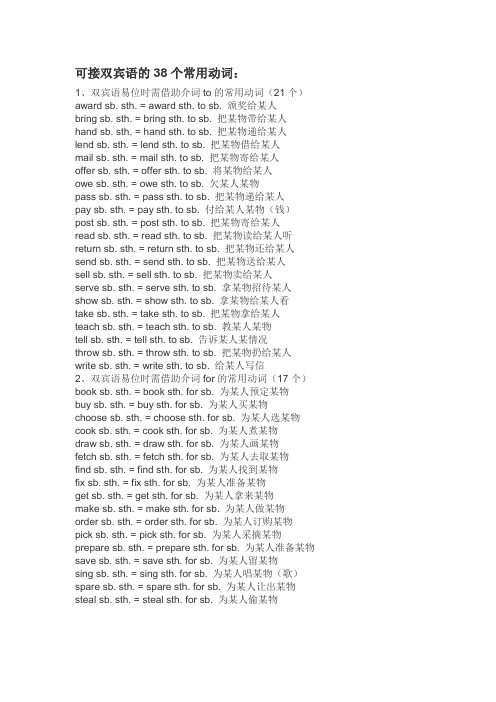
可接双宾语的38个常用动词:1、双宾语易位时需借助介词to的常用动词(21个)award sb. sth. = award sth. to sb. 颁奖给某人bring sb. sth. = bring sth. to sb. 把某物带给某人hand sb. sth. = hand sth. to sb. 把某物递给某人lend sb. sth. = lend sth. to sb. 把某物借给某人mail sb. sth. = mail sth. to sb. 把某物寄给某人offer sb. sth. = offer sth. to sb. 将某物给某人owe sb. sth. = owe sth. to sb. 欠某人某物pass sb. sth. = pass sth. to sb. 把某物递给某人pay sb. sth. = pay sth. to sb. 付给某人某物(钱)post sb. sth. = post sth. to sb. 把某物寄给某人read sb. sth. = read sth. to sb. 把某物读给某人听return sb. sth. = return sth. to sb. 把某物还给某人send sb. sth. = send sth. to sb. 把某物送给某人sell sb. sth. = sell sth. to sb. 把某物卖给某人serve sb. sth. = serve sth. to sb. 拿某物招待某人show sb. sth. = show sth. to sb. 拿某物给某人看take sb. sth. = take sth. to sb. 把某物拿给某人teach sb. sth. = teach sth. to sb. 教某人某物tell sb. sth. = tell sth. to sb. 告诉某人某情况throw sb. sth. = throw sth. to sb. 把某物扔给某人write sb. sth. = write sth. to sb. 给某人写信2、双宾语易位时需借助介词for的常用动词(17个)book sb. sth. = book sth. for sb. 为某人预定某物buy sb. sth. = buy sth. for sb. 为某人买某物choose sb. sth. = choose sth. for sb. 为某人选某物cook sb. sth. = cook sth. for sb. 为某人煮某物draw sb. sth. = draw sth. for sb. 为某人画某物fetch sb. sth. = fetch sth. for sb. 为某人去取某物find sb. sth. = find sth. for sb. 为某人找到某物fix sb. sth. = fix sth. for sb. 为某人准备某物get sb. sth. = get sth. for sb. 为某人拿来某物make sb. sth. = make sth. for sb. 为某人做某物order sb. sth. = order sth. for sb. 为某人订购某物pick sb. sth. = pick sth. for sb. 为某人采摘某物prepare sb. sth. = prepare sth. for sb. 为某人准备某物save sb. sth. = save sth. for sb. 为某人留某物sing sb. sth. = sing sth. for sb. 为某人唱某物(歌)spare sb. sth. = spare sth. for sb. 为某人让出某物steal sb. sth. = steal sth. for sb. 为某人偷某物。
含有双宾语的动词在变为被动语态时

含有双宾语的动词在变为被动语态时,有以下三种情形:一、有些双宾动词(如award, buy, give, leave, lend, offer, pay, show, teach, tell 等)在变为被动语态时,既可把间接宾语(指人)变为被动语态的主语,而把直接宾语(指事物)保留下来(称为保留宾语),也可把直接宾语(指事物)变为被动语态的主语,而把间接宾语改为介词to 或for引起的状语(到底用to还是for,与所搭配的动词有关)。
比较:He gave her some money. 他给她一些钱。
→ She was given some money.→Some money was given to him.He bought her a watch. 他给她买了一快表。
→ A watch was bought for her.→She was bought a watch.二、有些双宾动词(如bring, do, make, pass, sell, send, sing, write等)通常用直接宾语(指事物)作被动语态的主语,而将间接宾语用作保留宾语(其前根据情况用介词to或for):Father made me a doll.→ A doll was made for me.He wrote her a letter.→ A letter was written to her.三、有些双宾动词(如answer, deny, envy, refuse, save, spare等)通常用间接宾语(指人)作被动语态的主语,而将直接宾语用作保留宾语:He answered me that question.→ I was answered that qu estion by him满意回答2008-04-04 18:52三、被动语态的用法:1、不知道或没有必要指出谁是动作的执行者时。
The bridge was built last year.这座桥是去年建造的。
可接双宾语的38个常用动词
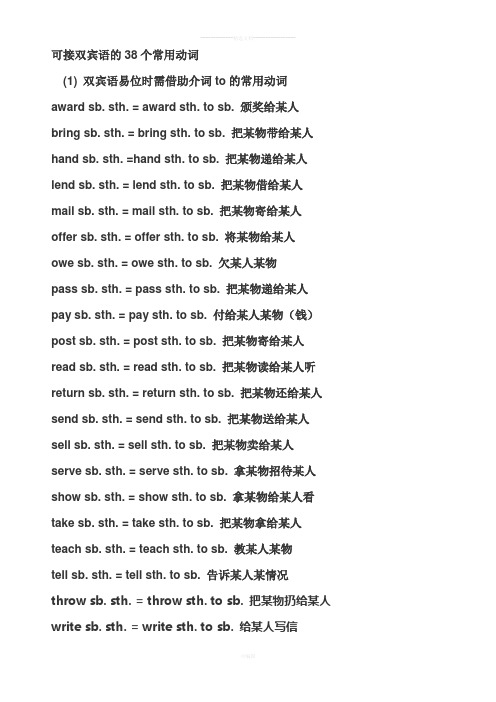
可接双宾语的38个常用动词(1) 双宾语易位时需借助介词to的常用动词award sb. sth. = award sth. to sb. 颁奖给某人bring sb. sth. = bring sth. to sb. 把某物带给某人hand sb. sth. =hand sth. to sb. 把某物递给某人lend sb. sth. = lend sth. to sb. 把某物借给某人mail sb. sth. = mail sth. to sb. 把某物寄给某人offer sb. sth. = offer sth. to sb. 将某物给某人owe sb. sth. = owe sth. to sb. 欠某人某物pass sb. sth. = pass sth. to sb. 把某物递给某人pay sb. sth. = pay sth. to sb. 付给某人某物(钱)post sb. sth. = post sth. to sb. 把某物寄给某人read sb. sth. = read sth. to sb. 把某物读给某人听return sb. sth. = return sth. to sb. 把某物还给某人send sb. sth. = send sth. to sb. 把某物送给某人sell sb. sth. = sell sth. to sb. 把某物卖给某人serve sb. sth. = serve sth. to sb. 拿某物招待某人show sb. sth. = show sth. to sb. 拿某物给某人看take sb. sth. = take sth. to sb. 把某物拿给某人teach sb. sth. = teach sth. to sb. 教某人某物tell sb. sth. = tell sth. to sb. 告诉某人某情况throw sb. sth. = throw sth. to sb. 把某物扔给某人write sb. sth. = write sth. to sb. 给某人写信(2) 双宾语易位时需借助介词for的常用动词book sb. sth. = book sth. for sb. 为某人预定某物buy sb. sth. = buy sth. for sb. 为某人买某物choose sb. sth. = choose sth. for sb. 为某人选某物cook sb. sth. = cook sth. for sb. 为某人煮某物draw sb. sth. = draw sth. for sb. 为某人画某物fetch sb. sth. = fetch sth. for sb. 为某人去取某物find sb. sth. = find sth. for sb. 为某人找到某物fix sb. sth. = fix sth. for sb. 为某人准备某物get sb. sth. = get sth. for sb. 为某人拿来某物make sb. sth. = make sth. for sb. 为某人做某物or der sb. sth. = order sth. for sb. 为某人订购某物pick sb. sth. = pick sth. for sb. 为某人采摘某物prepare sb. sth. = prepare sth. for sb. 为某人准备某物save sb. sth. = save sth. for sb. 为某人留某物sing sb. sth. = sing sth. for sb. 为某人唱某物(歌)spare sb. sth. = spare sth. for sb. 为某人让出某物steal sb. sth. = steal sth. for sb. 为某人偷某物注:有的动词后接的双宾语易位时,既可用介词to引出间接宾语,也可用介词for引出间接宾语,含义相同,如bring,play等:Bring me today’s paper. = Bring today’s paper to [for] me. 把今天的报纸拿给我。
英语中接双宾语的动词
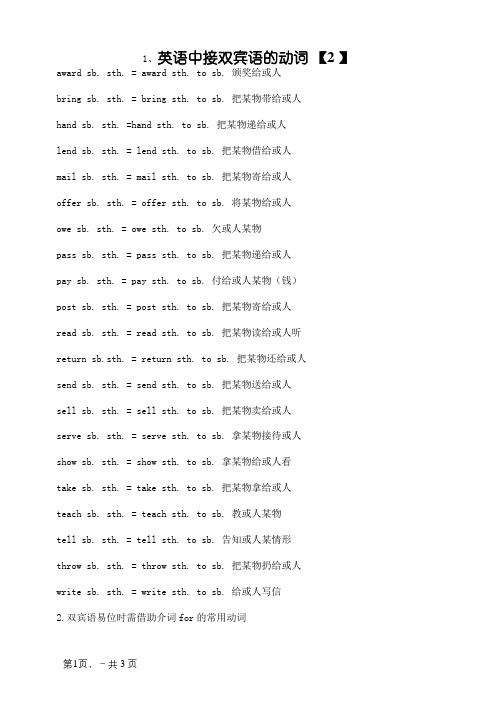
1、英语中接双宾语的动词【2 】award sb. sth. = award sth. to sb. 颁奖给或人bring sb. sth. = bring sth. to sb. 把某物带给或人hand sb. sth. =hand sth. to sb. 把某物递给或人lend sb. sth. = lend sth. to sb. 把某物借给或人mail sb. sth. = mail sth. to sb. 把某物寄给或人offer sb. sth. = offer sth. to sb. 将某物给或人owe sb. sth. = owe sth. to sb. 欠或人某物pass sb. sth. = pass sth. to sb. 把某物递给或人pay sb. sth. = pay sth. to sb. 付给或人某物(钱)post sb. sth. = post sth. to sb. 把某物寄给或人read sb. sth. = read sth. to sb. 把某物读给或人听return sb.sth. = return sth. to sb. 把某物还给或人send sb. sth. = send sth. to sb. 把某物送给或人sell sb. sth. = sell sth. to sb. 把某物卖给或人serve sb. sth. = serve sth. to sb. 拿某物接待或人show sb. sth. = show sth. to sb. 拿某物给或人看take sb. sth. = take sth. to sb. 把某物拿给或人teach sb. sth. = teach sth. to sb. 教或人某物tell sb. sth. = tell sth. to sb. 告知或人某情形throw sb. sth. = throw sth. to sb. 把某物扔给或人write sb. sth. = write sth. to sb. 给或人写信2.双宾语易位时需借助介词for的常用动词book sb. sth. = book sth. for sb. 为或人预定某物buy sb. sth. = buy sth. for sb. 为或人买某物choose sb. sth. = choose sth. for sb. 为或人选某物cook sb. sth. = cook sth. for sb. 为或人煮某物draw sb. sth. = draw sth. for sb. 为或人画某物fetch sb. sth. = fetch sth. for sb. 为或人去取某物find sb. sth. = find sth. for sb. 为或人找到某物fix sb. sth. = fix sth. for sb. 为或人预备某物get sb. sth. = get sth. for sb.为或人拿来某物make sb. sth. = make sth. for sb. 为或人做某物order sb. sth. = order sth. for sb. 为或人订购某物pick sb. sth. = pick sth. for sb. 为或人采摘某物prepare sb. sth. = prepare sth. for sb. 为或人预备某物save sb. sth. = save sth. for sb. 为或人留某物sing sb. sth. = sing sth. for sb. 为或人唱某物(歌)spare sb. sth. = spare sth. for sb. 为或人让出某物steal sb. sth. = steal sth. for sb. 为或人偷某物3.有的动词后接的双宾语易位时,既可用介词to引出间接宾语,也可用介词for引出间接宾语,寄义雷同.如bring,play等:Bring me today’s paper.= Bring today’s paper to [for] me. 把今天的报纸拿给我.He played us the record he had just bought.= He played the record he had just bought for [to] us.他放了他刚买的唱片给我们听.4.有的动词后接的双宾语易位时,即可用介词to引出间接宾语,也可用介词for引出间接宾语,寄义不同.如leave等:They left me no food.= They left no food for me.他们没给我留一点食物.My uncle left me a large fortune.= My uncle left a large fortune to me. 叔叔逝世后留下一大笔财产给我.5.而有的动词后接双宾语时,既不能用介词to引出间接宾语,也不能用介词for引出间接宾语.如allow, ask, cause, charge, cost, forgive, refuse等:He allows his son too much money.他给他儿子的钱太多.He asked me some questions. 他问了我一些问题.This caused me much trouble. 这给我带来了很多麻烦.He charged me five dollars for a cup of tea.他一杯茶向我要了5美元.His mistake cost him his job. 他的错误让他丢了工作.I envy you your good luck. 我爱慕你的好运.They forgave him his rudeness. 他们谅解了他的莽撞.He refused her nothing. 她要什么他就给什么.。
可接双宾语的38个动词
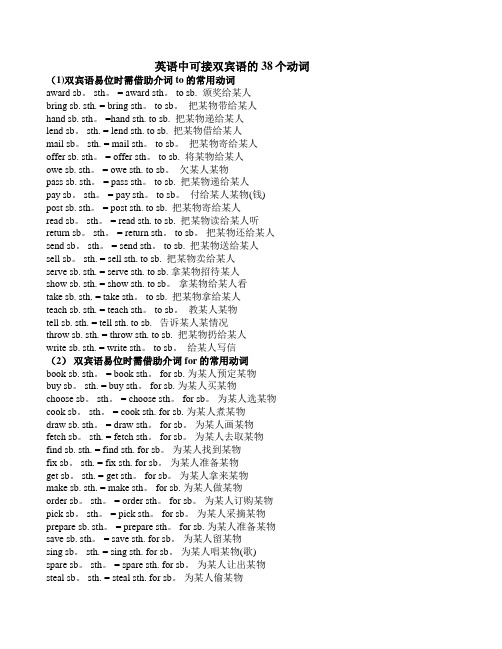
英语中可接双宾语的38个动词(1)双宾语易位时需借助介词to的常用动词award sb。
sth。
= award sth。
to sb. 颁奖给某人bring sb. sth. = bring sth。
to sb。
把某物带给某人hand sb. sth。
=hand sth. to sb. 把某物递给某人lend sb。
sth. = lend sth. to sb. 把某物借给某人mail sb。
sth. = mail sth。
to sb。
把某物寄给某人offer sb. sth。
= offer sth。
to sb. 将某物给某人owe sb. sth。
= owe sth. to sb。
欠某人某物pass sb. sth。
= pass sth。
to sb. 把某物递给某人pay sb。
sth。
= pay sth。
to sb。
付给某人某物(钱)post sb. sth。
= post sth. to sb. 把某物寄给某人read sb。
sth。
= read sth. to sb. 把某物读给某人听return sb。
sth。
= return sth。
to sb。
把某物还给某人send sb。
sth。
= send sth。
to sb. 把某物送给某人sell sb。
sth. = sell sth. to sb. 把某物卖给某人serve sb. sth. = serve sth. to sb. 拿某物招待某人show sb. sth. = show sth. to sb。
拿某物给某人看take sb. sth. = take sth。
to sb. 把某物拿给某人teach sb. sth. = teach sth。
to sb。
教某人某物tell sb. sth. = tell sth. to sb. 告诉某人某情况throw sb. sth. = throw sth. to sb. 把某物扔给某人write sb. sth. = write sth。
带双宾语的动词及其用法
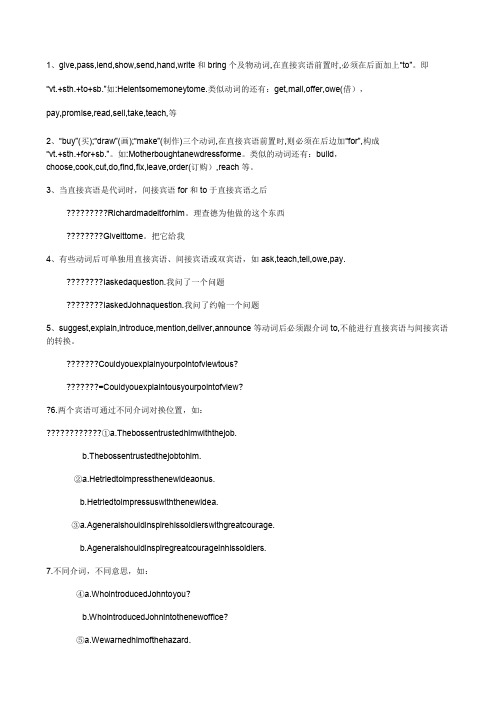
1、give,pass,lend,show,send,hand,write和bring个及物动词,在直接宾语前置时,必须在后面加上“to”。
即“vt.+sth.+to+sb.”如:Helentsomemoneytome.类似动词的还有:get,mail,offer,owe(借),pay,promise,read,sell,take,teach,等2、“buy”(买);“draw”(画);“make”(制作)三个动词,在直接宾语前置时,则必须在后边加“for”,构成“vt.+sth.+for+sb.”。
如:Motherboughtanewdressforme。
类似的动词还有:build,choose,cook,cut,do,find,fix,leave,order(订购),reach等。
3、当直接宾语是代词时,间接宾语for和to于直接宾语之后?????????Richardmadeitforhim。
理查德为他做的这个东西????????Giveittome。
把它给我4、有些动词后可单独用直接宾语、间接宾语或双宾语,如ask,teach,tell,owe,pay.????????Iaskedaquestion.我问了一个问题????????IaskedJohnaquestion.我问了约翰一个问题5、suggest,explain,introduce,mention,deliver,announce等动词后必须跟介词to,不能进行直接宾语与间接宾语的转换。
???????Couldyouexplainyourpointofviewtous????????=Couldyouexplaintousyourpointofview??6.两个宾语可通过不同介词对换位置,如:????????????①a.Thebossentrustedhimwiththejob.b.Thebossentrustedthejobtohim.②a.Hetriedtoimpressthenewideaonus.b.Hetriedtoimpressuswiththenewidea.③a.Ageneralshouldinspirehissoldierswithgreatcourage.b.Ageneralshouldinspiregreatcourageinhissoldiers.7.不同介词,不同意思,如:④a.WhointroducedJohntoyou?b.WhointroducedJohnintothenewoffice?⑤a.Wewarnedhimofthehazard.b.Wewarnedhimagainstthehazard.(a.指存在的危险;b.指可能的危险)⑥a.Whencomparedwitheachother,therearedifferencesbetweenthetwins.b.Wemaycomparethehearttoapump.(a.指同类人或物对比;b.指两样不同东西互相比拟)⑦a.Helenwasdisappointedoftheprize.b.Helenwasdisappointedintheprize.(a.指没得奖而失望;b.指对所得的奖不满而失望)⑧a.Thecakeisalliedtotheflour.b.IsTaiwanalliedwithAmerica?(a.指两样东西有关联;b.指两个国家有联盟关系)8.两个宾语与介词各就各位,固定不变,如:⑨Thepolicecautionedthetouristsofthedangerahead.(警惕)⑩CanadoctorcureJuneofherchronicillness?(医治)●Thecompanyhastocompensateitsstafffortheirlosses.(弥补)●Noonecandepriveacitizenofhishumanright.(剥夺)9.以返身代词为宾语的惯用语,如:●Ihopeyouwillavailyourselfofthegoldenopportunity.(利用)●My friendsoftenpridethemselvesontheirrareachievements.(以……自豪)●Jillknowshowtoinsinuateherselfintoherboss'sfavour.(向……献媚取宠)●Welookdownonthoseingratiatingthemselveswiththeirsuperiors.(讨好……)10、几个固定搭配的带双宾语的动词正确的说法: robsbofsth stealsbfromsth.类似的还有: curesbofillness治愈某人疾病ridsbofsth从----中除去(不好的东西)supplysbwithsth供给某人某物providesbwithsth给某人提供某物accusesbofsth控告某人某事cheatsbofsth骗取某人某物inform/advisesbofsth通知某人某事remindsbofsth是某人想起某事warnsbofsth警告某人某情况chargesbwithsth指责某人某事answer 回答Pleaseanswermethequestion.请回答我的问题bring 带Bringmethebook. 把书递给我buy 买Fatherboughtmeanicecream.爸爸给我买了一个冰淇淋。
双宾语用法回顾
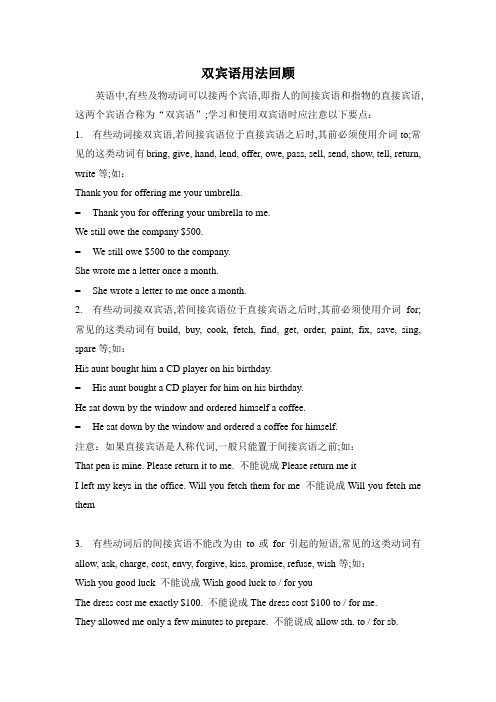
双宾语用法回顾英语中,有些及物动词可以接两个宾语,即指人的间接宾语和指物的直接宾语,这两个宾语合称为“双宾语”;学习和使用双宾语时应注意以下要点:1. 有些动词接双宾语,若间接宾语位于直接宾语之后时,其前必须使用介词to;常见的这类动词有bring, give, hand, lend, offer, owe, pass, sell, send, show, tell, return, write等;如:Thank you for offering me your umbrella.= Thank you for offering your umbrella to me.We still owe the company $500.= We still owe $500 to the company.She wrote me a letter once a month.= She wrote a letter to me once a month.2. 有些动词接双宾语,若间接宾语位于直接宾语之后时,其前必须使用介词for;常见的这类动词有build, buy, cook, fetch, find, get, order, paint, fix, save, sing, spare等;如:His aunt bought him a CD player on his birthday.= His aunt bought a CD player for him on his birthday.He sat down by the window and ordered himself a coffee.= He sat down by the window and ordered a coffee for himself.注意:如果直接宾语是人称代词,一般只能置于间接宾语之前;如:That pen is mine. Please return it to me. 不能说成Please return me itI left my keys in the office. Will you fetch them for me 不能说成Will you fetch me them3. 有些动词后的间接宾语不能改为由to或for引起的短语,常见的这类动词有allow, ask, charge, cost, envy, forgive, kiss, promise, refuse, wish等;如:Wish you good luck 不能说成Wish good luck to / for youThe dress cost me exactly $100. 不能说成The dress cost $100 to / for me.They allowed me only a few minutes to prepare. 不能说成allow sth. to / for sb.4. 有些动词接双宾语时,间接宾语前总是要加上介词to;常见的这类动词有announce, explain, express, introduce, report, suggest, describe, complain, mention等;如:Will you explain the poem to me once again 不能说成explain sb. sth.The headmaster introduced to us the famous scientist. 句中的to不能省略The girl reported to the policeman what she had seen in the street. 不能说成report sb. sth.5. 能够充当直接宾语的除了名词和代词以外,还可以是“疑问词+ 动词不定式”结构或宾语从句;如:The teacher told them what to do next.She asked me how I was getting on with my new job.Please remind him that the meeting has been put off till next week.6. 带双宾语结构的句子在变为被动语态时,通常有两种情况;如:She showed me a photo of her family.→I was shown a photo of her family.或A photo of her family was shown to me.He gave the little girl an apple.→The little girl was given an apple.或An apple was given to the little girl.。
可接双宾语的动词
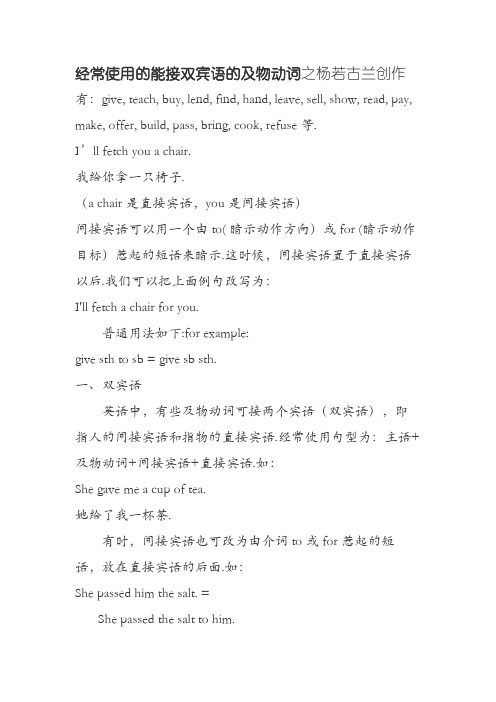
经常使用的能接双宾语的及物动词之杨若古兰创作有:give, teach, buy, lend, find, hand, leave, sell, show, read, pay, make, offer, build, pass, bring, cook, refuse等.I’ll fetch you a chair.我给你拿一只椅子.(a chair是直接宾语,you是间接宾语)间接宾语可以用一个由to( 暗示动作方向)或for (暗示动作目标)惹起的短语来暗示.这时候,间接宾语置于直接宾语以后.我们可以把上面例句改写为:I'll fetch a chair for you.普通用法如下:for example:give sth to sb = give sb sth.一、双宾语英语中,有些及物动词可接两个宾语(双宾语),即指人的间接宾语和指物的直接宾语.经常使用句型为:主语+及物动词+间接宾语+直接宾语.如:She gave me a cup of tea.她给了我一杯茶.有时,间接宾语也可改为由介词to或for惹起的短语,放在直接宾语的后面.如:She passed him the salt. =She passed the salt to him.她把盐递给了他.Her uncle bought her an English-Chinese dictionary yesterday. = Her uncle bought an English-Chinese dictionary for her yesterday. 昨天,她叔叔给她买了一本英汉词典.双宾语的特殊情况上面几种情况,通常要用介词to或for惹起的短语:1. 当直接宾语是人称代词(it/them),间接宾语是名词时:或两个宾语都是人称代词时.如:The watch is Li Lei's. Please give it to him.这块手表是李雷的.请把它给他.2. 当强调间接宾语时.如:Mother cooks breakfast for us every day.母亲每天都为我们做早餐.3. 当间接宾语比直接宾语长时.如:On the bus, he often gives his seat to an old person.在公共汽车上,他经常把坐位让给老人.注:由to连接间接宾语的动词有:pass, give, show, tell, lend, take等;由for连接间接宾语的动词有:buy, cook, get, sing, make等.(一) 双宾语易位时需借助介词to的经常使用动词award sb. sth. = award sth. to sb. 颁奖给某人bring sb. sth. = bring sth. to sb. 把某物带给某人hand sb. sth. =hand sth. to sb. 把某物递给某人lend sb. sth. = lend sth. to sb. 把某物借给某人mail sb. sth. = mail sth. to sb. 把某物寄给某人offer sb. sth. = offer sth. to sb. 将某物给某人owe sb. sth. = owe sth. to sb. 欠某人某物pass sb. sth. = pass sth. to sb. 把某物递给某人pay sb. sth. = pay sth. to sb. 付给某人某物(钱)post sb. sth. = post sth. to sb. 把某物寄给某人read sb. sth. = read sth. to sb. 把某物读给某人听return sb.sth. = return sth. to sb. 把某物还给某人send sb. sth. = send sth. to sb. 把某物送给某人sell sb. sth. = sell sth. to sb. 把某物卖给某人serve sb. sth. = serve sth. to sb. 拿某物接待某人show sb. sth. = show sth. to sb. 拿某物给某人看take sb. sth. = take sth. to sb. 把某物拿给某人teach sb. sth. = teach sth. to sb. 教某人某物tell sb. sth. = tell sth. to sb. 告诉某人某情况throw sb. sth. = throw sth. to sb. 把某物扔给某人write sb. sth. = write sth. to sb. 给某人写信(二) 双宾语易位时需借助介词for的经常使用动词book sb. sth. = book sth. for sb. 为某人预定某物buy sb. sth. = buy sth. for sb. 为某人买某物choose sb. sth. = choose sth. for sb. 为某人选某物cook sb. sth. = cook sth. for sb. 为某人煮某物draw sb. sth. = draw sth. for sb. 为某人画某物fetch sb. sth. = fetch sth. for sb. 为某人去取某物find sb. sth. = find sth. for sb. 为某人找到某物fix sb. sth. = fix sth. for sb. 为某人筹办某物get sb. sth. = get sth. for sb. 为某人拿来某物make sb. sth. = make sth. for sb. 为某人做某物order sb. sth. = order sth. for sb. 为某人订购某物pick sb. sth. = pick sth. for sb. 为某人采摘某物prepare sb. sth. = prepare sth. for sb. 为某人筹办某物save sb. sth. = save sth. for sb. 为某人留某物sing sb. sth. = sing sth. for sb. 为某人唱某物(歌)spare sb. sth. = spare sth. for sb. 为某人让出某物steal sb. sth. = steal sth. for sb. 为某人偷某物(三)有的动词后接的双宾语易位时,既可用介词to引出间接宾语,也可用介词for引出间接宾语,含义不异.如bring,play等:Bring me today’s paper.= Bring today’s paper to [for] me. 把今天的报纸拿给我.2. He played us the record he had just bought.= He played the record he had just bought for [to] us. 他放了他刚买的唱片给我们听.(四)有的动词后接的双宾语易位时,即可用介词to引出间接宾语,也可用介词for引出间接宾语,含义分歧.如leave等:They left me no food.= They left no food for me.他们没给我留一点食物.2. My uncle left me a large fortune.= My uncle left a large fortune to me. 叔叔死后留下一大笔财富给我.(五)而有的动词后接双宾语时,既不克不及用介词to引出间接宾语,也不克不及用介词for引出间接宾语.如allow, ask, cause, charge, cost, forgive, refuse等:He allows his son too much money.他给他儿子的钱太多.He asked me some questions. 他问了我一些成绩.This caused me much trouble. 这给我带来了很多麻烦.He charged me five dollars for a cup of tea.他一杯茶向我要了5美元.His mistake cost him his job. 他的错误让他丢了工作.I envy you your good luck. 我爱慕你的好运.They forgave him his rudeness. 他们谅解了他的鲁莽.He refused her nothing. 她要什么他就给什么.。
可接双宾语的动词
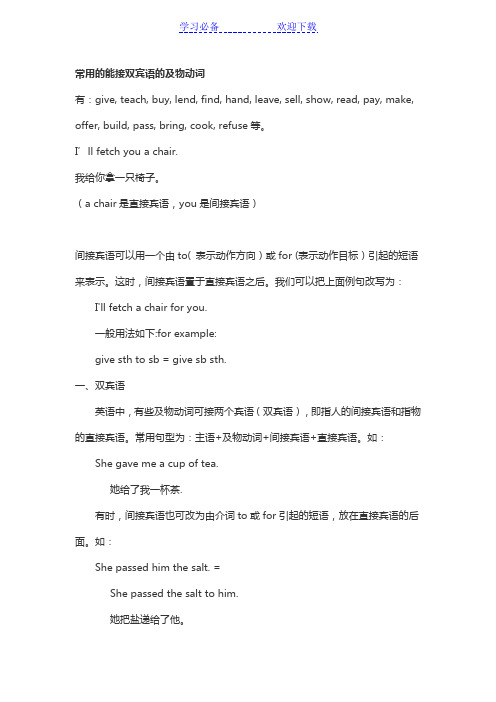
常用的能接双宾语的及物动词有:give, teach, buy, lend, find, hand, leave, sell, show, read, pay, make, offer, build, pass, bring, cook, refuse等。
I’ll fetch you a chair.我给你拿一只椅子。
(a chair是直接宾语,you是间接宾语)间接宾语可以用一个由to( 表示动作方向)或for (表示动作目标)引起的短语来表示。
这时,间接宾语置于直接宾语之后。
我们可以把上面例句改写为:I'll fetch a chair for you.一般用法如下:for example:give sth to sb = give sb sth.一、双宾语英语中,有些及物动词可接两个宾语(双宾语),即指人的间接宾语和指物的直接宾语。
常用句型为:主语+及物动词+间接宾语+直接宾语。
如:She gave me a cup of tea.她给了我一杯茶.有时,间接宾语也可改为由介词to或for引起的短语,放在直接宾语的后面。
如:She passed him the salt. =She passed the salt to him.她把盐递给了他。
Her uncle bought her an English-Chinese dictionary yesterday. = Her uncle bought an English-Chinese dictionary for her yesterday.昨天,她叔叔给她买了一本英汉词典。
双宾语的特殊情况下面几种情况,通常要用介词to或for引起的短语:1. 当直接宾语是人称代词(it/them),间接宾语是名词时:或两个宾语都是人称代词时。
如:The watch is Li Lei's. Please give it to him.这块手表是李雷的。
含有双宾语的动词在变为被动语态时
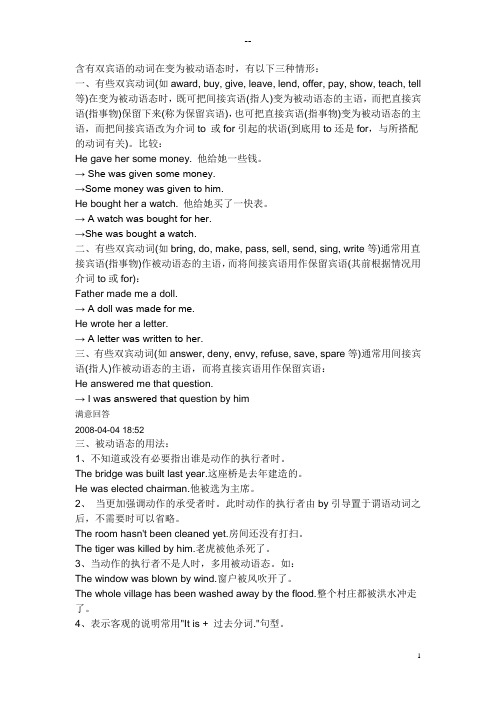
含有双宾语的动词在变为被动语态时,有以下三种情形:一、有些双宾动词(如award, buy, give, leave, lend, offer, pay, show, teach, tell 等)在变为被动语态时,既可把间接宾语(指人)变为被动语态的主语,而把直接宾语(指事物)保留下来(称为保留宾语),也可把直接宾语(指事物)变为被动语态的主语,而把间接宾语改为介词to 或for引起的状语(到底用to还是for,与所搭配的动词有关)。
比较:He gave her some money. 他给她一些钱。
→ She was given some money.→Some money was given to him.He bought her a watch. 他给她买了一快表。
→ A watch was bought for her.→She was bought a watch.二、有些双宾动词(如bring, do, make, pass, sell, send, sing, write等)通常用直接宾语(指事物)作被动语态的主语,而将间接宾语用作保留宾语(其前根据情况用介词to或for):Father made me a doll.→ A doll was made for me.He wrote her a letter.→ A letter was written to her.三、有些双宾动词(如answer, deny, envy, refuse, save, spare等)通常用间接宾语(指人)作被动语态的主语,而将直接宾语用作保留宾语:He answered me that question.→ I was answered that qu estion by him满意回答2008-04-04 18:52三、被动语态的用法:1、不知道或没有必要指出谁是动作的执行者时。
The bridge was built last year.这座桥是去年建造的。
- 1、下载文档前请自行甄别文档内容的完整性,平台不提供额外的编辑、内容补充、找答案等附加服务。
- 2、"仅部分预览"的文档,不可在线预览部分如存在完整性等问题,可反馈申请退款(可完整预览的文档不适用该条件!)。
- 3、如文档侵犯您的权益,请联系客服反馈,我们会尽快为您处理(人工客服工作时间:9:00-18:30)。
1、give, pass, lend, show, send, hand,write和bring 个及物动词,在直接宾语前置时,必须在后面加上“to”。
即“vt. + sth. + to + sb.” 如:He lent some money to me.类似动词的还有:get,mail,offer,owe(借),pay,promise,read,sell,take,teach,等
2、“buy”(买);“draw”(画);“make”(制作)三个动词,在直接宾语前置时,则必须在后边加“for”,构成“vt. + sth. + for + sb.”。
如:Mother bought a new dress for me。
类似的动词还有:build,choose,cook,cut,do,find,fix,leave,order(订购),reach等。
3、当直接宾语是代词时,间接宾语for和to于直接宾语之后
Richard made it for him。
理查德为他做的这个东西
Give it to me。
把它给我
4、有些动词后可单独用直接宾语、间接宾语或双宾语,如ask,teach,tell,owe,pay.
I asked a question. 我问了一个问题
I asked John a question.我问了约翰一个问题
5、suggest,explain,introduce,mention,deliver,announce等动词后必须跟介词to,不能进行直接宾语与间接宾语的转换。
Could you explain your point of view to us?
=Could you explain to us your point of view?
6.两个宾语可通过不同介词对换位置,如:
①a. The boss entrusted him with the job.
b. The boss entrusted the job to him.
②a. He tried to impress the new idea on us.
b. He tried to impress us with the new idea.
③a. A general should inspire his soldiers with great courage.
b. A general should inspire great courage in his soldiers.
7.不同介词,不同意思,如:
④a. Who introduced John to you?
b. Who introduced John into the new office?
⑤a. We warned him of the hazard.
b. We warned him against the hazard.
(a. 指存在的危险;b. 指可能的危险)
⑥a. When compared with each other, there are differences between the twins.
b. We may compare the heart to a pump.
(a. 指同类人或物对比;b.指两样不同东西互相比拟)
⑦a. Helen was disappointed of the prize.
b. Helen was disappointed in the prize. (a. 指没得奖而失望;b. 指对所得的奖不满而失望)
⑧a. The cake is allied to the flour.
b. Is Taiwan allied with America?
(a.指两样东西有关联;b. 指两个国家有联盟关系)
8.两个宾语与介词各就各位,固定不变,如:
⑨The police cautioned the tourists of the danger ahead.(警惕)
⑩Can a doctor cure June of her chronic illness?(医治)
● The company has to compensate its staff for their losses.(弥补)
● No one can deprive a citizen of his human right.(剥夺)
9.以返身代词为宾语的惯用语,如:
● I hope you will avail yourself of the golden opportunity. (利用)
● My friends often pride themselves on their rare achievements.(以……自豪)
● Jill knows how to insinuate herself into her boss's favour.(向……献媚取宠)
● We look down on those ingratiating themselves with their superiors.(讨好……)
10、几个固定搭配的带双宾语的动词
正确的说法:rob sb of sth steal sb from sth.
类似的还有:cure sb of illness 治愈某人疾病
rid sb of sth 从----中除去(不好的东西)
supply sb with sth 供给某人某物
provide sb with sth 给某人提供某物
accuse sb of sth 控告某人某事
cheat sb of sth 骗取某人某物
inform / advise sb of sth 通知某人某事
remind sb of sth 是某人想起某事
warn sb of sth 警告某人某情况
charge sb with sth 指责某人某事
answer 回答Please answer me the question. 请回答我的问题
bring 带Bring me the book. 把书递给我
Father bought me an ice cream. 爸爸给我买了一个冰淇buy 买
淋。
do 做Could you do it for me? 你能帮我做这事吗?
get 拿Get me a cup of tea. 给我拿杯茶。
give 给The teacher gave me some advice. 老师给了我一些建议。
hand 递Hand me the hammer. 把榔头给我
keep 保守Can you keep a secret for me? 你能为我保守秘密吗?leave 留下Some one left you this note. 有人给你留下这张条子。
lend 借She lent me her bike. 她把自行车借给了我。
make 做My mother made me a coat. 妈妈为我做了一件衣服。
offer 提供I offered him a glass of wine. 我敬了她一杯酒。
owe 欠Sandy owed Judy one dollar. Sandy 欠了Judy一美元。
pass 传Pass me the newspaper. 把报纸传给我。
promise 承诺He promised me a book. 他给了我一本书。
read 读Please read me the letter. 请帮我读一读这封信。
That will save us a lot of trouble. 那将省去我们许多麻save 省下
烦。
I sold my brother my car for 300 pounds. 我以300磅把车sell 卖
卖给了弟弟。
I’ll send grandma a gift on her birthday.祖母生日时我寄send 寄
给她一份礼物。
show 看Show your ticket, please. 请出示你得票子。
sing 唱Will you sing us a song? 你能为我们唱一首歌吗?
The work took us a week on finish. 这工作花去我们一个take 拿
星期的时间。
teach 教She teaches me French. 她教我们法语。
tell 说I told her my name. 我告诉她我的名字
wish 但愿I wish you a happy New Year. 新年快乐。
write 写Sue is writing her mother a letter 她正在给她妈妈写信。
cost deny envy refuse。
